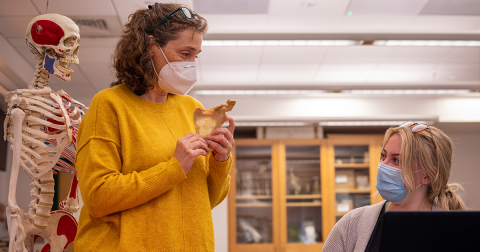
When one of her students was having difficulty, Teaching Lecturer Amy Ueland employed her time-tested strategy of friendly banter and learned that the student wanted to find a way to combine nursing and law enforcement. “I told him about my neighbor, a retired state trooper who is now a nurse, and offered to make the connection if he ever wanted to talk with him,” says Ueland. “A lot of students come in with their own personal story and I enjoy taking the time with them.”
Ueland’s passion for her field and eagerness to assist is widely recognized and appreciated by her peers, who selected her for this year’s Distinguished Teaching Lecturer Award. She’s been part of the PSU community for the past two decades. After earning her BS in environmental biology, Ueland came back to campus and acquired her teaching certification. She briefly taught middle school science before returning to Boyd Science Center, where she continues to make her mark.

Ueland teaches Anatomy and Physiology I and II and also serves as laboratory coordinator/technical specialist. Her in-depth knowledge of departmental offerings is frequently called upon in other roles, too. “Sometimes I say I’m the ‘go-to girl,’” she explains, as many people look to her with questions about departmental resources and where to find them.
Anatomy and Physiology students include those majoring in allied health, biology, chemistry, computer science, exercise and sport physiology, and nursing, which gives Ueland broad exposure to the PSU student body. She also co-advises the student-run Pre-Medical/Professional Society, a club that focuses on the medical field but is open to everyone.
Ueland’s teaching style incorporates collaborative learning that enlivens the traditional lecture format. “There’s lots of information that needs to be covered in a lecture,” she says. “When students seem confused, I’ll ask them to work with a partner for five minutes to discuss the topic and then we go over the material together. Having them talk to each other is a good learning strategy and it helps get them involved in the conversation.” Her engagement with students frequently extends beyond class time. “I’ve never minded helping students in off hours,” she says. “Sometimes my office is revolving with just about anybody, including previous students who are now in other classes. I’m also happy to meet with students at home through Zoom.”
Earlier in her career, Ueland was focused on the natural world, and she worked as a naturalist for the Pennsylvania Girl Scouts of America, the Audubon Society, Newfound Area Lakes Association, and with the Loon Preservation Committee. Her current interests include the history of science and diseases, which she explores in her Plagues & Peoples course, and she has also been instrumental in helping to re-develop and re-design labs for Human Anatomy and Physiology and for Human Biology, providing students with more hands-on, inquiry-driven learning experiences. Additionally, she played a key role in the restructuring of curriculum for non-major biology courses.
“Amy is a natural teacher, and she has the greatest rapport with students in the Boyd Science Center because she cultivates it daily,” says longtime colleague and recently retired Professor Leonard Reitsma. “She has willingly taken on new courses to service the needs of Biology, despite having many duties as the tech specialist. She has also been a glue within Biology behind the scenes. She is humble and always willing to serve, and her students know how much she cares about them.”
Ueland is currently partnering with two colleagues, Professors Diana Jolles and Brigid O’Donnell, on designing enriching laboratory experiences for lab teaching assistants (TAs). Spending additional time on activities such as examining human bones helps both the TAs and the undergraduates they mentor. “One of the best things about being a TA is that you have additional opportunities to retain information that you’re going to need when you enter your field,” says Ueland. “In Anatomy and Physiology, we have a lot of good, motivated students who are working toward a variety of careers. Becoming a TA not only reinforces their knowledge base, it creates a collective learning experience for all of those involved. Students look to their TAs for guidance and see their excitement and love for the subject and, for some, by the end of the semester they are asking how they can become a TA. I love seeing how students grow and the impact of peer learning.”
Sharing her expertise and enthusiasm comes easily to Ueland and it’s what motivates her to come to campus every day. “I enjoy interacting with the students—it’s a lot of fun,” she says. “But it’s not just the students, it’s the community at PSU and everyone I work with here in Boyd. Everyone is friendly and great to work with.”

